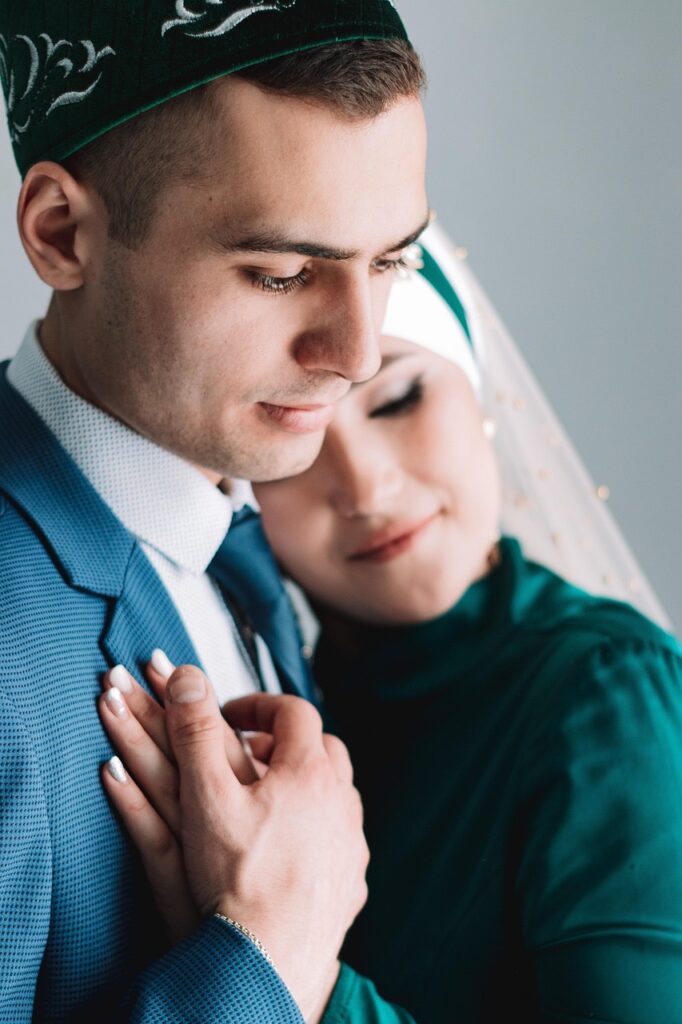
Why Muslims Can Marry Jewish and Christian Women Despite Changes in Their Scriptures?
Why Muslims Can Marry Jewish and Christian Women-In the Qur’an, Jews and Christians are referred to as Ahl al-Kitab (People of the Book) because they received divine revelation from God, even if the writings were later changed. Why Islam Allows Marriage to Jewish and Christian Women Despite Changes in Their Scriptures
Discover the Islamic ruling on Muslim men marrying Jewish & Christian women. Learn why the Qur’an permits marriage to “People of the Book” despite acknowledging changes in their scriptures, the conditions required, and the wisdom behind this ruling.
1. The Qur’an Calls Them “People of the Book”
In the Qur’an, Jews and Christians are called Ahl al-Kitab (People of the Book) because they originally received divine revelation from God — even if the texts were later altered.
This title acknowledges that their faiths originated from authentic prophets and books, even though corruption happened over time.
Interfaith marriage in islam
Qur’an 5:5
“Today all good things have been made lawful for you. The food of those who were given the Scripture is lawful for you, and your food is lawful for them. And [lawful in marriage are] chaste women from among the believers, and chaste women from among those who were given the Scripture before you…”
Table of Contents
2. Distinction Between Faith and Authenticity of Text
Islam distinguishes between:
Belief in God and the original prophets — Jews and Christians still affirm one God (though with theological differences like the Trinity) and follow many of the moral teachings from those prophets.
Authenticity of current scripture — even if altered, it still contains traces of truth.
Because they retain some foundational truths, they are not treated like polytheists or idol worshippers in marriage and food laws.
3. The Wisdom Behind the Ruling Social relationships and da’wah (invitation to Islam)

Marriage can serve as a bridge between groups, allowing for peaceful coexistence and religious discourse.
In 7th-century Arabia, Jews and Christians were prominent adjacent populations, as opposed to idolaters, who denied the concept of a single God totally.
4. Interfaith marriage in islam Conditions and Limits
Classical Islamic law says:
The woman must be chaste (morally upright).
The Muslim man must remain committed to his own faith and raise the children as Muslims.
Muslim women, traditionally, are not permitted to marry non-Muslim men — because in Islamic law the household’s religion is presumed to follow the husband’s lead.
In short: “If the Torah and Bible have been changed, then those following them can’t be called true believers, so why would Islam allow marriage to them?”
Even if the Torah and Bible today are altered, the communities that follow them are still recognized in Islam as having originated from divine revelation. That’s why marriage to their women is permitted for Muslim men, under certain conditions.
5. Islam Does Not Say Jews & Christians Are “True Believers” in the Qur’anic Sense

The Qur’an makes it clear:
Believers (mu’minīn) are those who accept the last revelation and Prophet Muhammad ﷺ.
Jews and Christians who reject the Prophet are not counted among the true believers for salvation.
However, the Qur’an still gives them a special legal category: Ahl al-Kitab — different from polytheists (idol worshippers).
So they are not “true believers” like Muslims, but they are also not treated like pagans.
6. Why They Still Have a Special Status
The Qur’an acknowledges their original prophets and scriptures were from God:
Qur’an 3:3 — “He sent down the Torah and the Gospel before as guidance for the people…”
Even though the current versions are altered (Qur’an 2:79 speaks about writing with their own hands), they still hold traces of the original revelation.
That connection to divine revelation gives them a “half-shared” religious foundation with Muslims:
Belief in one Creator (even if Christians have Trinity misunderstandings)
Belief in some of the same prophets and moral codes.
7. What Changed and What Remains
The Qur’an doesn’t say everything in their books is false — it says parts are distorted or misinterpreted.
This means:
Some verses are preserved truth.
Some verses are human additions.
We cannot precisely separate every original part — but the core idea of one God and moral law survives.
8. The Legal Reason Marriage Was Allowed
The permission for Muslim men to marry Jewish or Christian and Muslim women is a legal ruling from God in Qur’an 5:5 — revealed after the Qur’an already declared that their scriptures were altered.
That means Allah knew they had changes in their books, but still gave that allowance.
Scholars say the wisdom is:
They are not outright idolaters.
Marriage can bring people together and help Islam spread through family bonds.
Since children must be raised Muslim, Islam stays the main religion in the home.
Conclusion
In summary, the Islamic permission for Muslim men to marry chaste women from the Jewish and Christian faiths is a nuanced ruling rooted in the Qur’anic concept of Ahl al-Kitab (People of the Book). While Islam clearly states that the current Torah and Bible have been altered and that their followers are not “true believers” in the Qur’anic sense without accepting the final message, it simultaneously acknowledges their faiths’ divine origins. This creates a unique theological and legal status for them, distinct from polytheists.
In these faiths, the decision does not mean that all beliefs are acceptable. Instead, it is a practical and smart legal allowance. Instead, it is a sensible and useful legal option. It recognizes that religion, prophecy, and moral law all come from the same place and will always be there, even though they have been changed over time. It understands that religion, prophecy, and moral law all have a common base that has been damaged over time but still exists. This acceptance, together with strict rules like the need for women to stay chaste and children to be raised according to Islamic values, brings people together, makes it easier to talk to each other, and protects Muslim identity within the family. It is a divinely bestowed exception that harmonizes religious convictions with the empathetic truths of society.
General Disclaimer:
“Always consult a Islamic scholar, or legal professional before making significant decisions.”
Liability:The author and publisher are not liable for financial, legal, or religious outcomes arising from the use of this information.
FAQ: Why Muslims Can Marry Jewish and Christian Women
Q1: If the Torah and Bible have been modified, what makes their believers different from polytheists?
A: Islam draws an important line. It admits that the contemporary scriptures are flawed, but it also believes that the first revelations to Moses and Jesus were true and came from God. People who follow these religions, called “Ahl al-Kitab” (People of the Book), still believe in one God, prophecy, and a moral code based on those initial teachings. This shared monotheistic core, even if it is not perfect, puts them in a different group from people who worship idols or many gods.
Q2: Does this suggest that Islam sees Jews and Christians as “believers”?
A: In the Qur’an, the word “believer” (mu’min) means someone who believes in the last message and Prophet Muhammad ﷺ. No, not in that exact sense. But because of their historical relationship to divine revelation, they have a particular and revered legal standing. They are not considered believers like Muslims (in the eyes of Muslims), but they are also not considered non-believers like polytheists.
Q3: What does a Muslim man need to do to marry a lady who is Jewish or Christian?
A: The main conditions are:
The woman ought to be pure and have good morals.
The marriage must be done with an Islamic marriage contract (Nikah).
The Muslim spouse must be devoted to his faith and is religiously required to rear any offspring from the marriage as Muslims.
Q4: Why may Muslim men marry women from the People of the Book, but not the other way around?
A: This decision is founded on the Islamic idea that the husband is in charge of the family and is in charge of leading the family in religious matters. When a Muslim man marries a Jewish or Christian woman, the home stays Islamic, and the kids are raised as Muslims. In the other case, the Muslim woman and her children could lose their religious identity and rights. This difference is a legal protection, not a judgment about how valuable each person is.
Q5: Does Interfaith marriage permission come from the Quran?
A: The main source is Surah Al-Ma’idah (Chapter 5), Verse 5: “And [lawful in marriage are] chaste women from among the believers and chaste women from among those who were given the Scripture before you…”
Q6: What is the reason for legalizing Interfaith marriages?
A: Scholars cite various forms of wisdom:
It helps Muslim and non-Muslim populations get along by building bridges of respect and peaceful coexistence.
Dawah (Invitation to Islam): It can be a way for the wife and her extended family to see how beautiful Islam is in action via her husband’s character.
Practical Reality: It gives Muslims a legal way to get married in places where they are a minority or live with people of other monotheistic faiths.
Q7: Does this decision apply to all branches of Christianity and Judaism?
A: Traditional Islamic scholars usually used this ruling for people who identify with faiths that have been historically known to be based on revealed scripture. Some modern scholars disagree on some modern sects or denominations whose main beliefs may be very different from monotheism. For example, some Unitarians or groups that worship figures other than God. But the core idea is still broad.
Q8: Is this decision still important today?
A: Yes, for sure. The decision is now a permanent part of Islamic law. It is especially important in this globalized world because it encourages understanding between religions and helps Muslims living in diverse societies keep their faith and family structure.
